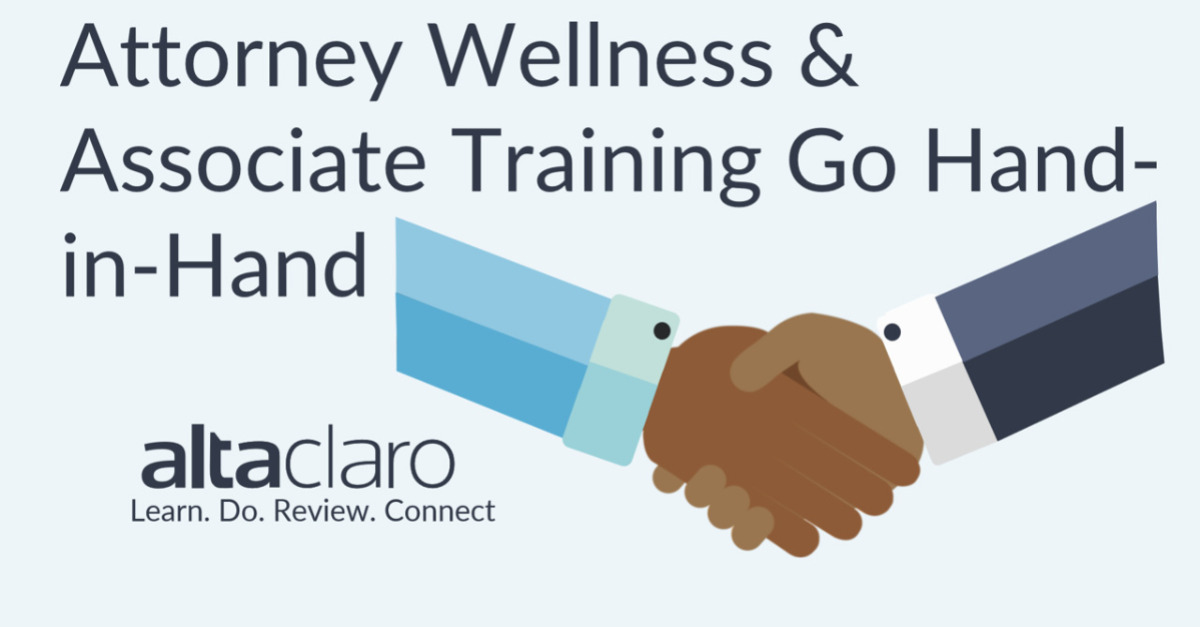
The legal industry right now is abuzz with discussion about attorney wellness—and for good reason.
In a recent survey of 1,700 legal professionals conducted by LawCare, 69% of respondents said they had experienced mental ill-health in the past year, with a huge surge of nearly 150% of legal professionals seeking professional support for anxiety since January 2021.
Despite these widespread issues, many attorneys are hesitant to discuss these issues openly for fear of the stigma and possible career implications. However, some law firms are beginning to quickly realize the gravity of this issue. According to the CDC, poor mental health and stress can wreak havoc on one’s job performance and productivity, engagement with one’s work, communication with coworkers, as well as the physical capability and daily function—with depression reducing cognitive performance about 35% of the time.
With all of these issues at hand, then, how can law firms set up their new attorneys for success and integrate well-being into their organizations? As Kendra Brodin, EsquireWell founder and CEO, aptly shares in a recent article in the ABA Journal, “A legal organization can bring in the best speakers, distribute top-end well-being swag—think yoga mats, stress balls, water bottles, healthy snacks and more—and reward coveted prizes in competitions (such as most steps taken or miles run).” But “even more than the speakers, swag, and rewards, lawyers need to know that their legal organizations and leadership actively want them to take care of their mental and physical health.”
It’s clear, then, that law firms need to go beyond lip service or superficial attempts—they need to take action.
One of the most effective ways to address lawyer well-being is to implement an effective associate training program. In fact, research has shown that the lack of knowledge and ineffective training has a strong correlation with high-stress levels in the workplace. Training is so important that the ABA’s National Task Force on Lawyer Well-Being even recently defined “Intellectual” as one of the six key pillars of lawyer well-being, meaning that a lawyer needs to be regularly engaged in “continuous learning” and in the “pursuit of creative or intellectually challenging activities that foster ongoing development.” Therefore, cognitive wellness is an important component of attorney wellness.
Associate training 101
It goes without saying that not all training is created equal. Attorneys need smart, effective training that gives them the right confidence and skills to succeed.
The most effective training is training that allows associates to get their feet wet and even into the swimming pool before getting into the deep end. Education science research has shown us that our retention levels increase on a sliding scale, from the more abstract/passive (what we read, see, and hear) to the more concrete/active (what we write and do). Specifically, we retain 10% of what we learn from reading, 30-50% from watching lecture/explainer videos, 70% from participating in small interactive workshops, and 90% from doing either real or simulated assignments.
So how can you put these concepts into practice? Use mock transactions from past deals or matters so your associates can practice applying legal principles and concepts to real-world scenarios. By simulating real work experience, associates can learn to effectively apply their knowledge in a safer and less stressful environment. You can even break up these mock tasks into shorter segments and assign soft time allotments so your associates become familiar with how much time a task typically takes. This is also a huge time-saver for those responsible for creating training materials. Instead of drafting and planning training content from scratch, simply turn to your past deals or matters for inspiration.
Training shouldn’t end here, though, when associates merely finish their tasks. For an associate, one of the most valuable learning experiences is jumping into a real-world scenario and receiving feedback on their mock work products. Your feedback will have real-world implications, giving your associates the confidence and peace of mind that they can succeed when their focus turns to real matters.
In conclusion, this isn’t at all to say that training cures mental health issues. But by implementing impactful training, your firm can help create a less stressful environment for your associates while providing them with the resources and skills they need to flourish.
Improve your attorney wellness
Firms such as K&L Gates, Orrick, Herrington & Sutcliffe, Barnes & Thornburg, Taft Stettinius & Hollister, and Husch Blackwell turn to AltaClaro for the most effective training programs on the market.
Our online boot camps help lawyers leverage technology and learn practical legal skills in a hybrid format through mock transactions and live feedback sessions with seasoned practitioners. From Fundamentals of M&A Transactions and Corporate Transactions to Capital Markets, our course catalog spans beginner to intermediate level classes. Our state-of-the-art learning technology platform also helps you measure and track training engagement and performance so you can see exactly how your training is driving better results for your employees as well as your ROI.
Schedule a free 30-minute consultation with one of our experts and learn how you can increase your attorney wellness through more effective training engagement.

